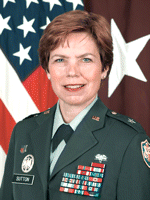Brig. Gen. Loree Sutton retired last November from her post as the founding director of the Defense Centers of Excellence for Psychological Health and Traumatic Brain Injury (DCoE). Today, the psychiatrist is at home in rural New Mexico, getting adjusted to civilian life after 25 years in the U.S. Army and deciding what new paths she'll choose for her future.
"I'm taking a little time off and thinking about the second chapter in my life," she said in a recent interview with Psychiatric News. "I want to continue to build on my passion for our troops and their families and work at the community level to inform leaders about the neural foundations of effective leadership."
Her big problem now, she said: "How do I dress like a civilian?"
For the previous three years, though, she dealt with much larger concerns.
A California native, Sutton followed an undergraduate degree in business with her M.D. from Loma Linda University, whose medical school emphasizes holistic medical practices.
"I've always been interested in organizations, community dynamics, and leadership, so business and medicine did not seem so far apart," she said.
Joining the Army following medical school, she did her internship and residency at Letterman Army Medical Center in San Francisco from 1985 to 1989. She was chosen as a PGY-1 to be one of the Army surgeon general's representatives at the APA component meetings, an opportunity that introduced her to organized psychiatry. There she met Melvin Sabshin, M.D., and Jay Cutler, J.D., who were then, respectively, APA's medical director and director of government relations, and she later spent a month at APA headquarters working with Cutler's government relations team.
"So I learned early on how the political process informs medical policies and our efforts as psychiatrists, from the local up to the international level," she said.
Once out of residency, she served as the mental health officer for a battalion-sized task force as part of the multinational force that supervises the 1979 peace treaty between Israel and Egypt. She worked first with the families of the soldiers and then joined the troops in the Sinai.
"It was the best introduction to the profession of arms I could have, leading me to love and respect those who answer this calling of service and sacrifice," she said. She went on to serve as division psychiatrist with the 1st Armored Division in Germany and later in Kuwait and Iraq during the Persian Gulf War in 1991.
War Experience Changes Career Plans
The wartime experience changed her life. She had earlier assumed that she would join the Army, put in the time needed to pay back her scholarship, then go on with a civilian medical career. Instead, it defined her next 20 years of service to soldiers and their families.
She held a series of increasingly responsible commands over that time. Eventually, after serving as commander of the Carl R. Darnall Army Medical Center at Fort Hood, Texas, she was tapped in 2007 to take on the job as the first director of the DCoE.
The center was established to coordinate research and care for wounded service members and veterans. As more troops were stressed by combat and the strain of multiple deployments, many returned to their homes with unseen wounds of war stemming from exposure to concussive blast, posttraumatic stress, depression, grief and other health concerns.
Her team's task was stimulated by a paradox of military medicine. Advanced knowledge and techniques saved more lives on the battlefield, but left more of those survivors with complex wounds, visible and invisible.
Priority Shifted to Brain Trauma
Roadside bomb blasts rapidly became a major cause of head wounds for military personnel in Iraq and Afghanistan, setting off an urgent need to better identify, diagnose, and treat traumatic brain injury and its psychiatric sequelae.
Concern increased further after the Washington Post published stories about poor treatment of recuperating troops at Walter Reed Army Medical Center.
"This was the opportunity of a lifetime to be on point for the Department of Defense in regard to the unseen wounds of war," she said. "I have a heart full of gratitude for the trust that our troops and their families have placed in the approach our team has laid out.
"We started with a blank piece of paper and a title and then developed a much different organization from what we had imagined."
The DCoE was, she said, a "hybrid" organization, pulling together personnel and resources from the Department of Defense, the VA, other government agencies, and the academic medical world "to establish best practices and quality standards for the treatment of psychological health and traumatic brain injury," according to its Web site.
The DCoE's operational mandate was also multifaceted, covering research, prevention, clinical care standards, education and training, communications, and patient, family, and community outreach.
She drew on people and institutions across the military services, such as the Center for the Study of Traumatic Stress at the Uniformed Services University of the Health Sciences, the Defense and Veterans Brain Injury Center, the Center for Deployment Psychology, the Deployment Health Clinical Center, and others. She also created a new center for telehealth and technology.
Sutton sought models from the business world as she developed the organization. In the 21st century, businesses' ability to survive depends on alliances, relationships, and collaboration to quickly move forward and produce results, she said.
Forced to Play Catch Up
"We were figuring it out as we went," she said. "I knew that time was not our friend—that we were on a journey and that as much progress as we were making, we couldn't move fast enough. We needed the leadership and resources when the conflict began in 2003."
Her desire to move forward quickly was often confounded by the same tendency that has limited other military efforts to change ingrained cultural views about mental health.
"We still have a challenge regarding stigma," she said. Mid-career, mid-level personnel seem to find that change especially difficult.
"As psychiatrists, we have some ideas about changing people's behavior," she said. "You can order someone to behave in a certain way, or you can change attitudes by changing experience."
She recalled an encounter with an old sergeant major who grumbled to her that his request for a new maintenance officer was filled by a woman soldier. A month after the woman began work in his unit, however, he was unwilling to trade her for anyone else.
Analogously, something similar has to happen with stigma and the unseen wounds of war, Sutton said.
"Resilience, suicide prevention, and mission performance all boil down to the culture in the foxholes, on the deckplates, on the flight lines, and the kitchen tables."
Success Noted
One notable success came when, spurred by the DCoE, all the military services placed into use a mandatory, event-based protocol for managing concussion, accompanied by a protocol for psychological health.
The DCoE also worked with Sesame Workshop, an arm of the "Sesame Street" children's program, to create an award-winning DVD series on deployment stress, the wounds of war, and family grief.
The series used the "Sesame Street" Muppets and age-appropriate language to model communication between adults and children about how military families deal with the loss of a loved one.
(At Sutton's retirement celebration, the "Sesame Street" puppet Elmo teamed up with Sutton for a chorus of "Happy Trails.")
Among other things, Sutton told Garry Trudeau, creator of the cartoon series "Doonesbury," about the experiences of those who had served in the military. Trudeau then elaborated these ideas into long-running storylines in his comic strip that gave an enlisted person's view of war and military life.
Sutton remained a tireless cheerleader for the cause, alerting listeners inside and outside the military services to the needs of troops whose lives were forever altered by their combat experience.
In her farewell letter to those who worked under her command at DCoE, she wrote:
"The wars in Iraq and Afghanistan could end tomorrow; our mission to restore health, hope, and humanity will endure for decades. We simply must uphold our commitment to all who have borne the burdens of war on our behalf … ."
"I'm proud of what our team did," she said recently, "I have a heart full of gratitude for the trust that our troops and their family members have placed in the approach our team laid out."
And, summing up her experience, she recalled a line from a 1966 speech by Robert F. Kennedy (who in turn was quoting Machiavelli): "There is nothing more difficult to take in hand, more perilous to conduct, or more uncertain in its success than to take the lead in the introduction of a new order of things."
Information about the Defense Centers of Excellence for Psychological Health and Traumatic Brain Injury is posted at <www.dcoe.health.mil>. 
